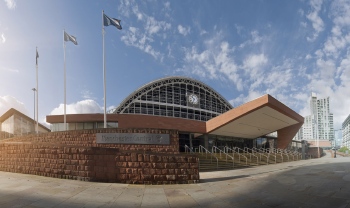Controls in control

The quickest and most effective energy-saving measures can be achieved with effective controls and a BeMS. Lisa Gingell of t-mac Technologies suggests cost-effective approaches to cut carbon emissions and energy costs.
Something as simple as leaving the lights on can be very costly to any business, which is why we are often called upon to help corporations turn those small changes into big returns — and it nearly always starts with the light switch.
Other energy-intensive equipment is also incorporated into the controls, but it’s not just about controlling equipment — it’s about making it right for the internal environment whilst considering the external conditions.
The biggest decision during late summer is whether heating/cooling should be on or off; it is perhaps the easiest ‘fix’, particularly with a BeMS.
For any business, finding that perfect mix of hot outside and cool within is what every industry wants to achieve for the wellbeing of employees and comfort of customers. Plus, it is common sense that a good heating and cooling strategy during the summer pays off for business with energy saving and cost reduction.
Based on experience, here is our list of top quick fixes.
• Don’t forget the golden rule of considering external conditions when managing the internal environment. In summer months, staff and customers are dressed for the season so there’s no need to set the air conditioning to cool to 18°C; a comfortable 21°C will suffice.
• Link all heating and cooling systems together to make sure they are working in harmony.
• Employ a BeMS that will work with your business and your unique requirements. The t-mac BeMS, for example, is flexible, and its control strategies are set to suit the internal environment your building is capable of achieving in an efficient way.
• Make sure items are turned off at night or between shifts. There is no point having the lights on when no one is in the building.
An effective controls strategy does not just consider the equipment and the environment, it also considers the energy bill. Additional financial savings can be achieved if your business is on a flexible tariff, as Distribution Use of System (DUOS) charges mean that any energy consumed between 4 and 7 p.m. (plus, in London between midday and 2 p.m.) is twice the price. Load shedding and load shifting in these periods can dramatically reduce energy bills. In addition reducing energy consumption during these periods all year round gives a financial gain through the reduction of the transmission network use of system (TNUoS), which applies cost to your energy bill from the three highest peaks of electricity demand between November and February.
Such controls strategies can be applied to large sites and even those with 24/7 operations. Take, for example, the Manchester Central award-winning exhibition and conference venue. It is a vast place and the venue of choice for some of the UK’s leading events. The complex has 25 meeting spaces and three conference and exhibition halls of 23 000 m², so it is easy to see why something like a forgotten light switch can make it an energy dark hole.

Manchester Central called for the creation of a detailed programme of smart metering across its site. The aim was to give full visibility of energy consumption so as to be able to create an effective energy-reduction plan and improve building controls.
A number of t-mac units were installed across the Manchester Central site. They are set to monitor a number of points within the facility, and more than 174 meters are now being monitored by the system.
These meters include mains gas, electricity and water. There is also sub-metering of many other items such as distribution boards, plant rooms, kitchen equipment and waste disposal units.
The information about consumption is visible on a web-based dashboard and can be viewed on computers, tablets and smart phones.
It is also planned that the energy saving data will be displayed on digital signage around the venue.
Manchester Central operates 24/7, so the need is for all energy to be monitored all day every day.
There is also a need to understand where energy is being wasted —whether that is during an event, in-build or breakdown.
Manchester Central is also achieving significant financial savings from the reduction in its energy consumption.
By mapping the venue’s mains consumption, the whole energy profile can be seen, and targets through the t-mac software can be created.
The control system enables users to manage building conditions in line with business operations and changing climates whilst ensuring energy efficiency and cost-reduction practices are pivotal to the BeMS strategy.







